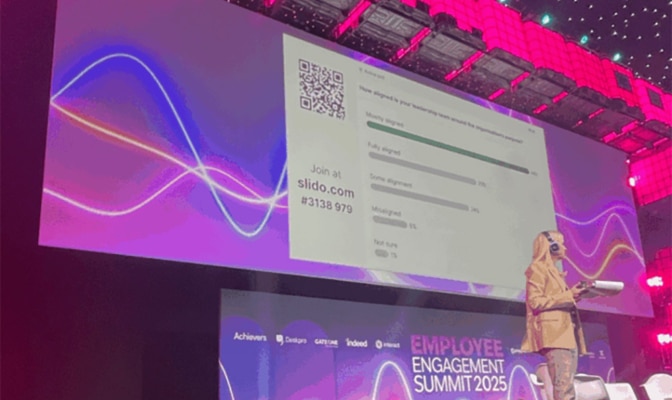The CIPD Festival of Work 2025 brought together communication experts, HR professionals, strategists, thought leaders, and even a few celebrities, to explore how organisations can evolve to meet the complex demands of today’s workplaces.
The day featured a rich mix of panels, presentations and practical sessions spanning topics from what makes a good leader to how to be change-ready, and tips to better engage your workforce.
Here are our key takeaways from the day:
Employee engagement must be built, not bought
Disengagement often stems from a lack of emotional connection at work. People’s wants and aspirations aren’t rooted in logic – they’re emotional. It’s not about what employees do, but how they feel. Real engagement begins when employees feel different at work – when they have a sense of belonging, meaning or inspiration. But this engagement cannot be bought with surface-level perks or short-term initiatives; it comes from a culture that’s consistent, authentic and embedded in everyday behaviours.
One panel warned of “culture debt” – the disconnect that forms when a company’s values and messaging doesn’t match the employee experience. The most engaged organisations go beyond transactional culture to foster a culture that creates an emotional connection and rallies people around a shared vision.
Managers are the missing link
The vital role of managers in driving employee engagement was a recurring theme throughout the day. While many employees move into managerial roles by becoming experts in their field, they often struggle with the shift from expert to leader. This transition can leave managers underprepared to effectively engage their teams.
The data speaks volumes: in 2024, manager engagement sits at just 27% – yet managers account for 70% of their team’s engagement levels. This dip doesn’t just impact morale; it has real business consequences, costing organisations millions in lost productivity. If organisations want to improve engagement, they must first prioritise engaging and empowering their managers.
Transformational leadership is rooted in empathy
A thought-provoking perspective came from the cyber security world: psychological safety in an organisation is a security measure. When employees feel safe to speak up and admit mistakes, they’re less likely to fall for phishing scams and more likely to report breaches early. However, when such attacks occur, many leaders instinctively ask, “What did the employee do wrong?”, while empathetic leaders flip the question: “What did the attacker do right?” This shifts the focus from blame toward systemic improvements, learning and future prevention.
It was a compelling reminder that empathy isn’t ‘soft’ – it’s strategic. The most effective leaders build cultures where people feel trusted and supported, and in doing so, they strengthen both resilience and performance.








